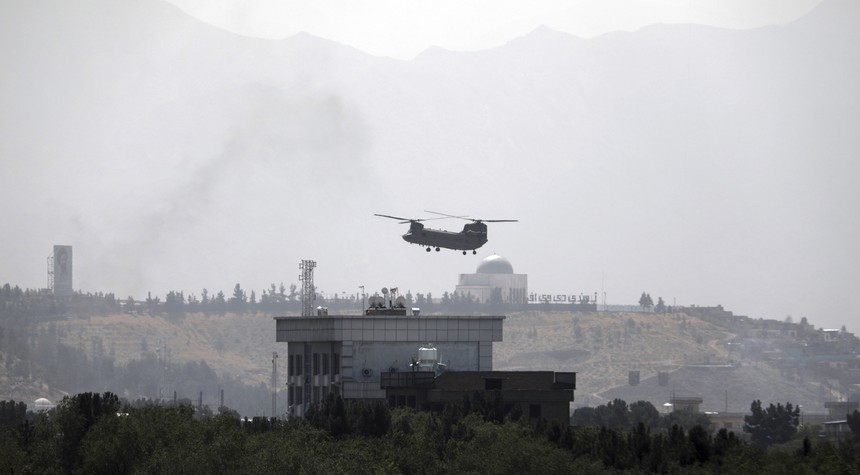
AP Photo/Rahmat Gul
As American troops were preparing to leave Kabul for the last time, their commanders had their priorities straight: As we now know, they weren’t taking steps to ensure that all American citizens could safely leave the country. They also weren’t doing anything to get $85 billion worth of American weaponry into safe hands, which we know because the Taliban are now the proud owners of all that taxpayer-funded materiel. They weren’t even doing anything to make sure that it was the Afghans who actually helped us who got onto the planes out of Kabul. No, U.S. commanders in Afghanistan had a far more important priority on their minds: making sure that the Marines didn’t leave behind any messages that the Taliban or ISIS would find insulting.
Marines at Kabul’s airport had taken out their frustration over the catastrophically humiliating mismanagement of the withdrawal from Afghanistan, and the failure of the twenty-year mission in general, by leaving some coarse messages on the airport’s walls: “F*** ISIS,” “F*** the Taliban,” that sort of thing. Not high-level diplomatic communications, to be sure, but the kind of thing that has happened in wartime since time immemorial. Until now, that is. Not only did commanders demand that the troops scrub the walls clean and remove the graffiti; they also ordered them to clean the place up, so that the Taliban would have a spotless airport to showcase for all the international authorities who will soon be flying in to Kabul to deliver their billion-dollar aid packages. One Marine recounted: “My boys had to go…pick up every last piece of…trash for who? The Taliban? It was a slap in the face to us.”According to the UK’s Daily Mail, “Marine spokesman First Lt. Jack Coppola said that the cleanup was enforced to prevent delaying any flights leaving the airport. But it is unclear why the graffiti was also removed.”
Maybe it was because Biden’s handlers didn’t want to anger a group that they don’t consider to be an enemy of the United States. A few weeks ago, MSNBC’s Nicolle Wallace asked National Security Advisor Jake Sullivan: “What is the Taliban? Are they now our frenemy, are they our adversary, are they our enemy? Are they our — what are they?”
Sullivan refused to call the Taliban our enemy, saying: “Well, it’s hard to put a label on it, in part because we have yet to see what they are going to be now that they’re in control — physical control of Afghanistan.” Sullivan was just echoing a position his nominal boss took back in December 2011, when he declared: “Look, the Taliban per se is not our enemy. That’s critical. There is not a single statement that the president has ever made in any of our policy assertions that the Taliban is our enemy because it threatens U.S. interests.”
The Taliban have no such reservations. A Taliban spokesman made that clear back in 2014 by saying that Barack Obama’s trade of five Taliban commanders for deserter Bowe Bergdahl was the first time the “enemy,” that is, the United States, had “officially recognized our status.” Before that, in 2012, the leader of the Taliban at that time, Mullah Mohammad Omar, urged “every brave Afghan” to “expand the area of infiltration in the ranks of the enemy.”
Related: BOMBSHELL: U.S. Officials Handed Taliban a List of Names of Americans and Afghan Allies
Now U.S. taxpayers are going to help fund those who think of the U.S. as the enemy. Secretary of State Antony Blinken declared at the end of August that “the United States will continue to support humanitarian aid to the Afghan people. Consistent with our sanctions on the Taliban, the aid will not flow through the government, but rather through independent organizations, such as U.N. agencies and [non-government organizations.] And, we expect that those efforts will not be impeded by the Taliban or anyone else.”
Is Blinken really so naïve as to think that this “humanitarian aid” will not find its way to the most powerful and most ruthless entity in the country, which also happens to be in power? Blinken, like the rest of Biden’s handlers, is working from venerable and multiply-discredited assumptions of the foreign policy establishment that he should know better than to try to reapply in Afghanistan at this late date. They include the assumptions that good will gestures will be reciprocated, and that America can win friends, or at least reliable allies, by essentially buying them with “aid.”
Now, after the U.S. fought the Taliban for twenty years, Biden’s handlers appear to think that they can buy its friendship and compel it to moderate its behavior with our largesse. We have already poured obscene amounts of money into Afghanistan and have less than nothing to show for it, but hey, maybe what has never worked up to now will work this time. And so the Marines had to clear away their rude graffiti. We must not offend the Taliban. Why, after a few billion in aid, we will have won their hearts and minds for freedom! Right? Right?
Robert Spencer is the director of Jihad Watch and a Shillman Fellow at the David Horowitz Freedom Center. He is author of 23 books including many bestsellers, such as The Politically Incorrect Guide to Islam (and the Crusades), The Truth About Muhammad and The History of Jihad. His latest book is The Critical Qur’an. Follow him on Twitter here. Like him on Facebook here. For media inquiries, contact communications@pjmedia.com.



I recall something similar took place with US spies in China after Obama became president.